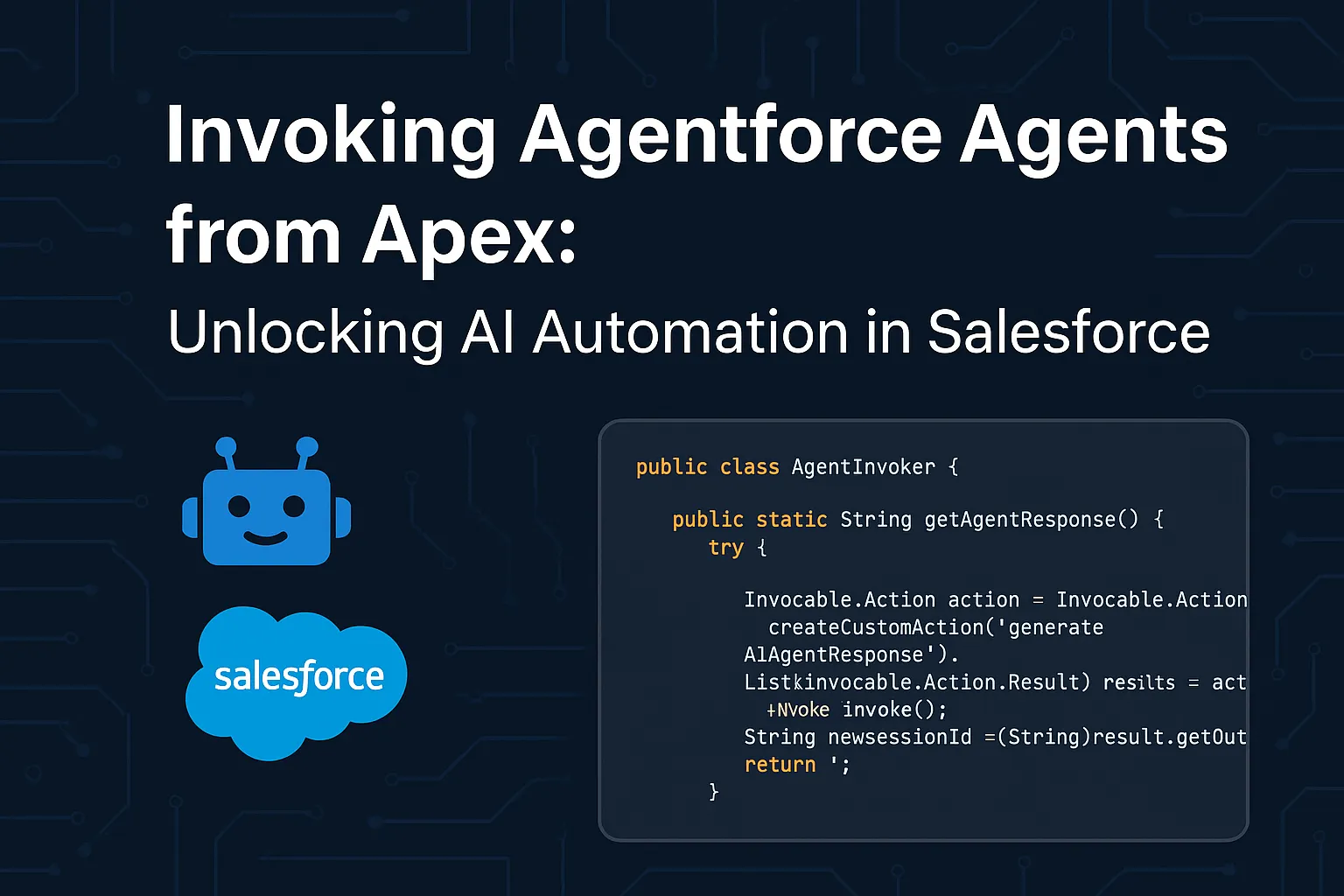
Salesforce Agentforce empowers users to bring conversational intelligence and task automation directly into everyday workflows. With recent enhancements, it’s now possible to invoke Agentforce agents programmatically from both Apex and Flow.
In this blog we will invoke the Agent from Apex class.
What Are Agentforce Agents?
Agentforce agents in Salesforce are specialized AI entities built to automate and augment business processes:
Employee-Facing Agents: Tasks such as summarizing records, automating common activities, and extracting insights, operating under the permissions of the Salesforce user.
Customer-Facing Agents: These act as digital labor on websites or apps, answering questions, assisting shoppers, or qualifying leads while using dedicated user profiles and permissions.
Why Invoking Agents from Apex or Flow Matters
Previously, Agentforce was mostly accessed through UI chat modals. Now, direct invocation from Flow or Apex enables:
- Orchestration of complex automation behind buttons, web components, or external endpoints.
- Seamless integration of agentic intelligence into any business logic path in Salesforce.
- Persistent and context-aware interactions (using session IDs), allowing agents to maintain conversational context across invocations.
Enable Agentforce (Default) in Your Org
- In the Quick Find box Search for Agentforce Agents
- Select Agentforce Agents

- Turn on the toggle button Enable the Agentforce (Default) Agent

- Now you will see the Agent named Agentforce (Default)

How to Invoke Agentforce Agents
Invoking via Apex
- Go to your Developer Console
- Create an Apex Class named AgentInvoker
- Copy below Apex Code in your apex class
AgentInvoker.apxcpublic class AgentInvoker { public static String getAgentResponse() { try { // Create an instance of the invocable action with type 'generateAiAgentResponse' and name 'Copilot_for_Salesforce' Invocable.Action action = Invocable.Action.createCustomAction('generateAiAgentResponse', 'Copilot_for_Salesforce'); action.setInvocationParameter('userMessage', 'Summarize my case'); action.setInvocationParameter('CaseId', 'your case Id'); if (sessionId != null) { // Add session id only if it exists action.setInvocationParameter('sessionId', sessionId); } // Execute the action List<Invocable.Action.Result> results = action.invoke(); Invocable.Action.Result result = results[0]; // Handle the response if (result.isSuccess()) { // Retrieve the Session id and Agent Response System.debug('Output Session Id: ' + result.getOutputParameters().get('sessionId')); System.debug('Output Agent Response: ' + result.getOutputParameters().get('agentResponse')); return 'Successfully Invoked Agent!'; } else { System.debug('Java action execution failed: ' + result.getErrors()); return 'Invoking Agent failed!'; } } catch (Exception e) { System.debug('Error invoking Java action: ' + e.getMessage()); return 'Error in Invoking the Agent'; } } }
- Create a trigger named LeadTrigger
- Copy below code and paste it to your trigger
LeadTrigger.apxttrigger LeadTrigger on Lead (before insert) { if (Trigger.isBefore && Trigger.isInsert) { AgentInvoker.getAgentResponse(); } }
Conclusion
Invoking Agentforce Agents from Apex brings the power of conversational AI directly into your Salesforce backend logic. With just a few lines of code, you can trigger intelligent, context-aware responses that enhance user productivity and streamline business processes.